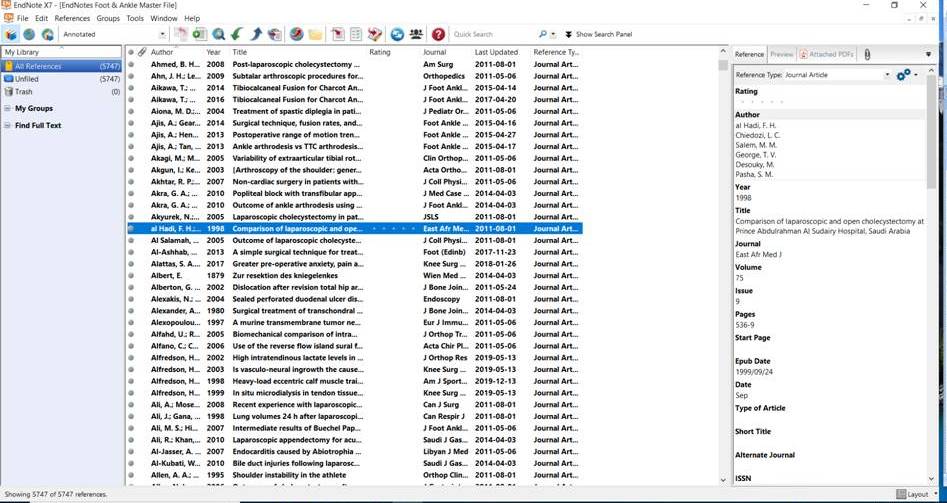How do you input and format the citations when you’re writing up your essay, manuscript, thesis, or other lengthy document? You could easily have at least 40 or 50 references, more if it’s a review paper, and maybe even 150 or 200 or more if it’s a full thesis.
Inputting and tracking your references manually is unwieldy and cumbersome and can quickly become overwhelming. Especially if you end up submitting your manuscript to more than one journal, where each one has a different reference reporting style and you’re stuck reformatting all the citations.
Several citation management systems are available to make the job much easier. Many are free; some have a modest cost, which might be paid by your university or hospital to make it freely accessible for you. Systems include (in no particular order): Mendeley, EndNote, Zotero, RefMan, Refworks, Perrla, Bookends, ReadCube, and Paperpile.
What should a good citation management system do?
First, it should let you set up multiple “libraries,” where each library holds the citations which you can then organize by author, publication year, title, or journal. For a given citation, it should provide all the key information: all authors, publication year, title, journal, volume, issue, pages, e-publication date, keywords, abstract, DOI number, and PCID or PMCID number. The library should be searchable: just input an author name or keyword, and bingo! all matches are highlighted.
In a best-case scenario, the system is compatible with PubMed (and other public searchable databases) for automatic download/transfer of the above information with a single click, so you don’t have to do any manual inputting or copy & paste repeatedly.
Ideally, the system should also allow you to attach the full PDF of the article (if you have it) and to manually add notes and/or research notes.
A good system should allow easy sharing (importing/exporting) of libraries with people in different locations for collaboration. It should potentially be accessible via web-based and cloud-based programs, for storage and access when you’re travelling or working off multiple computers.
The most common citation management systems are EndNote, Mendeley and Zotero, so I’ll briefly explore each of these here. Disclaimer – I have no financial relationship with these companies, and I do not receive any benefits, financial or otherwise, from promoting these products.
EndNote
I personally use EndNote, which has a modest one-time cost of $100, with free updates and support. EndNote used to be owned and run by Thomson Reuters, but now is managed and distributed by Clarivate Analytics, and they offer a free 30-day trial with tutorial support here.
I’m very happy with EndNote. It has all the features I discussed above. The program had a bit of a learning curve initially (not much though, quite intuitive), and I find it easy to use. Much more intuitive and user friendly than RefMan was. It’s simple to import EndNote citations into my Word document and to subsequently edit, delete, or re-order them.
The initial EndNote program downloaded onto your computer has well over 200 different journal styles for formatting the citations, including the ever popular APA and Vancouver styles. If you don’t find the one you need in the drop-down menu, the journal style you need is available online and can be downloaded for free.
Endnote automatically inputs the entire citation from PubMed into its library. When you find an interesting abstract on PubMed, just click on “Send to” and “Citation Manager,” and it does the rest of the work for you. You can also attach the PDF of the full article and add your own research notes.
If someone else sends you a Word document with EndNote citations, they are stored as a “travelling library,” which you simply download, either into your existing library, or as a separate library. And if you store your library on a cloud, you can readily share it with other people. Great for collaborative work.
The majority of my work is in the foot and ankle subspecialty of orthopaedics, so I’ve set up a large “Master” file for all papers across this topic area that I use for multiple clients and projects. This library currently holds over 5,700 citations, many with PDFs attached. When working on large review papers, or projects in other topic areas, I set up separate libraries for those on a project-by-project basis.
Zotero and ZBib
Zotero is an open source, free, web-based citation management system that works best as a Firefox extension, so if download speed is slower for any reason, you may experience a potential lag time. Many people have recommended Zotero, but they say it does not have quite the same feel and functionality as EndNote. I haven’t used it personally, so I can’t comment in that regard.
You login to Zotero and set up an online account, which allows you to store files in one or multiple libraries on a cloud, to access them from anywhere, and to share them with groups, publicly or privately. Books, journal articles and web pages are added via Zotero Connector, which is also used to save PDFs.
After downloading Zotero, a plug-in for Microsoft Word (Zbib) is automatically downloaded if you have Word installed on your computer, which allows you to add and edit citations in your Word document. The bibliographic citations are arranged in alphabetical order, and apparently one can change the citation format in Preferences.
Mendeley
Mendeley and Mendeley Cite is a free, web-based reference management system owned by Elsevier that allows you to access your library from anywhere and generate citations in a range of journal styles. References are easily organized by groups or lists and are searchable. Some consider the Mendeley web interface to be the most intuitive of the three systems.
Mendeley allows sharing of citations and documents with up to two other users, and thus has limitations for collaboration with larger groups.
Neither Zotero nor Mendeley upload all metadata perfectly, so you’ll need to clean the references yourself. But this occasionally happens in EndNote, too.
Not sure which system to use? If cost is critical, a lot of people swear by Zotero or Mendeley. If you can afford the modest cost of EndNote, this system offers some additional benefits and is faster to use for incorporating citations into documents.
American University Washington DC published a comparison chart of the three systems that may help you navigate the decision process. Also, ask your university library if they offer a seminar or tutorial comparing these systems. If they don’t offer one already, they might do so based on your suggestion. An article in the Journal of the Medical Library Association also provides a comprehensive comparison of the three systems (Ivey & Crum, 2018 Jul; 106(3):399-403).
Ultimately, I think the preference comes down to which of these systems you tried first and your level of familiarity. I’d love to hear from other people about their experiences and preferences. Feel free to share a comment below.
I’d like to thank various Twitter discussions and Dr. Miranda van Tilburg (@DrvanTilburg) specifically for suggesting this blog topic.
Was this #WeeklyWritingTip helpful? I welcome topic suggestions for future writing tips.



Recent Comments